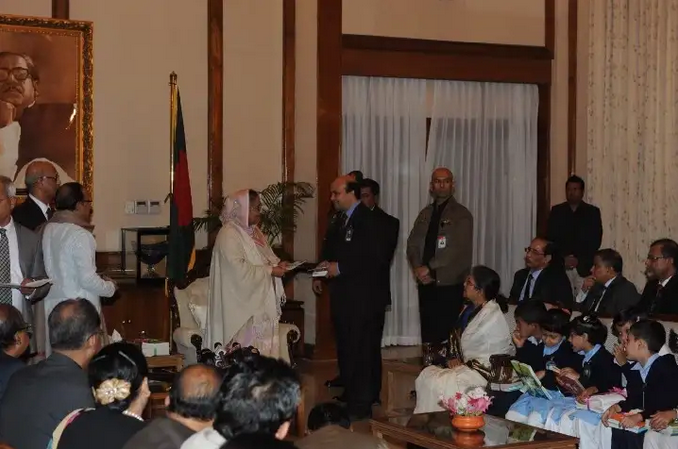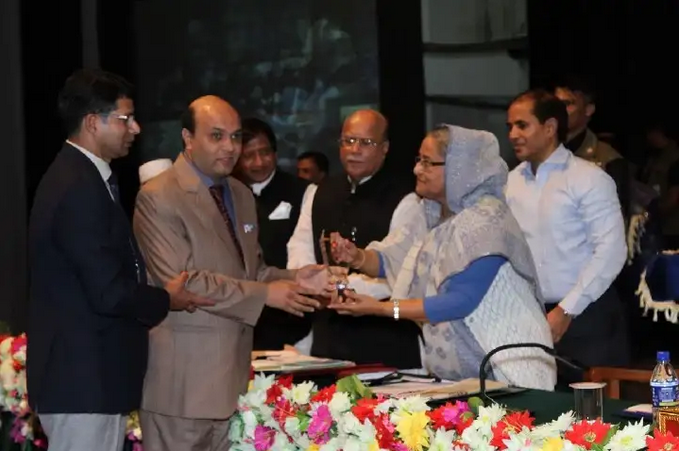12 March, 2023
What is Smart Bangladesh really?
What was a dream on March 7, 1971—Independent Bangladesh—became a reality on December 16, 1971....

No single person has done more to build an inclusive digital Bangladesh than Vashkar Bhattacharjee. Working with the government-sponsored Aspire to Innovate (a2i) program, Vashkar spearheaded a comprehensive overhaul of the country’s sprawling digital infrastructure. “Our government runs the largest web portal in the world,” he told us, “with more than 33,000 websites connected to a single central hub. All 33,000 sites are now accessible for persons with disabilities, as are more than 200 e-services.”
Bangladesh’s digital infrastructure is robust, but so is its digital divide. “For persons with access to technology,” explained Vashkar, “Bangladesh has almost everything. But many persons don’t have access, especially persons with disabilities. They might not have computers in their homes, or smartphones, or electricity, even. This is something we must work to change.”
After serving as an accessibility consultant for the United Nations Development Programme in 2013, Vashkar drafted Bangladesh’s National Web Accessibility Guidelines in accordance with the international W3C 2.0 Standard, led a massive push to convert written materials to accessible formats, and pioneered a nation-wide effort to make higher education accessible. All these projects have been grounded in his lived experience, but none more so than the last. The University of Chittagong, now distinguished as the first university in Bangladesh to take real strides toward being disability-inclusive, is Vashkar’s alma mater — but once, they denied him admission because he is blind.
To be fair to the University of Chittagong, they weren’t the only ones to stonewall Vashkar. “I tried to enter many universities,” he remembered, “but they all refused my application. Some other visually impaired applicants and I began a hunger strike. Suddenly, just like that, they decided to let us in.”
Getting through the door was but the first of many hurdles. The faculty had never taught students with visual impairments, and many still believed that people with disabilities were burdens on society and nothing more. Misunderstandings and conflicts occurred with clockwork regularity. “One day,” recalled Vashkar, “I was taking notes on my Braille slate, and the professor thought I was playing games. He told me to stand up and leave the room. I complained to the head of the department, who called the professor to his office. He was shocked when I read him my Braille notes. He thought it was magic!”
Even before arriving at the university, Vashkar had been forced to sink or swim in a sea of disabling attitudes. Born in 1979 in the remote, southeastern village of Bagdondi, Chittagong Division, he’d known challenges from early childhood. Intelligent and tenacious as he was, he was never guaranteed to succeed. “My father was a civil servant,” he said, “my mother was a housewife, and both were well educated. When I was two years old, after they discovered I was blind, they resolved to do everything in their power to support me. But this idea was rare.”
In those days, Bagdondi had no resident physicians or hospitals, much less accessible education facilities. After an extended period of searching, Vashkar’s father finally met a doctor who told him of a primary school for blind children in Chittagong. For junior high, however, he had no choice but to attend the mainstream school. “There were no Braille books and very few Braille papers or writing frames,” he said. “The teachers didn’t know how to teach me.” High school brought more of the same. Because of these experiences, Vashkar entered the University of Chittagong with his armor on.
Now, thanks to his efforts, the university has introduced a disability quota system and streamlined the admissions process. Accessible reading materials are available, as are fellowships for students with disabilities and over 300 free online courses, which students can access through MuktoPaath, a self-directed digital learning platform. Students with disabilities can also use university computers and smartphones. For those who’ve never used such devices before, training is available.
In addition to policy changes and material resources, Vashkar also offers guidance and mentorship to the Association of Students with Disabilities. He’s ensured that group members are trained on the UN Convention on the Rights of Persons with Disabilities — “Bangladesh,” he noted proudly, “was the first country to sign and ratify the treaty with all the optional protocols” — as well as the Bangladeshi Persons with Disabilities Rights and Protections Act of 2013. In addition to familiarizing students with these legal frameworks, the training sessions Vashkar designed also cover effective methods of advocacy and activism.
“Today,” said Vashkar, “no student should go through what I went through at the university. This is very important to me.”
His difficulties didn’t end with graduation. “I finished my MA in general history,” he said, “and then, for some time, I was unemployed.” Few Bangladeshis with disabilities have access to education, fewer still enter the workforce, and even those who do find jobs are often relegated to specific roles and sectors. Those with visual impairments, for example, usually work with foreign NGOs or become instructors for blind students. Thanks to this de jure segregation, most Bangladeshis never work with people with disabilities and hence have no reason to question the stereotypes they’ve learned. Even as Bangladesh takes extraordinary strides toward establishing legal protections and accessible digital infrastructure, the country’s job market remains supersaturated with disabling attitudes.
Eventually, Vashkar realized that just having a degree wouldn’t land him a job. He would need technical skills as well. He started seeking opportunities and, in 2002, secured a place in the Duskin Leadership Training Program, a Japan-based initiative that serves young, aspiring leaders with disabilities throughout the Pacific and Asia. “That was a turning point in my life,” said Vashkar. “I came to understand my purpose: in a nutshell, to make services inclusive and accessible for persons with disabilities.”

After finishing the program in 2003, he began volunteering with Young People in Social Action (YPSA), an organization based in Chittagong, developing computerized Braille production and enabling more efficient printing and distribution of Braille materials. In 2005, he was introduced to the Digital Accessible Information System (DAISY) Consortium and became an assistive technology instructor. He brought DAISY to Bangladesh and, with support from the Prime Minister’s Office, began converting textbooks to multimedia digital talking books. From this format, they can be converted easily to accessible e-books or digital Braille books, which in turn can be printed and distributed with relative ease.
“When my elder daughter was in grade one,” said Vashkar, “she would come to me asking for help with her reading. But she was getting only printed books from school, so of course I couldn’t help her. Now, we have books that we can read together.”
Because of this initiative, accessible editions are available for all Bangladeshi textbooks used in classes one through 12. Bangla-language e-reading software has also been developed, as has the country’s first accessible dictionary — critical tools for Bangladeshis who are visually impaired and speak no other languages. For this work, Vashkar has earned an abundance of accolades, racking up an average of one national or international award per year between 2014 and 2022. “Search my name in English or in Bangla on any search engine, and you will find hundreds, maybe thousands of articles,” he said. “I’m the first person with a disability to serve in an advisory capacity to the Bangladeshi Prime Minister’s Office. This makes a big difference. Having access to policymakers enables us to do a great deal more.”
In recent years, Vashkar has continued his efforts to build out Bangladesh’s digital infrastructure and make more resources available for persons with disabilities. “We must have accessible platforms for knowledge exchange so we can learn from one another,” he said. To this end, he’s currently developing e-commerce platforms that will enable thousands of entrepreneurs with disabilities to connect across national borders.

Since the advent of COVID-19, Vashkar has contributed to efforts to make health-related information and services accessible for people with disabilities via a national helpline. “It’s been very difficult,” he reflected. “Many students with disabilities can only access assistive devices at the university, and now we’re confined to our homes. People used to happily help us cross the road, but these days, nobody approaches anyone. Persons with disabilities sometimes don’t know where to go in case of illness, or which medical professionals will treat us respectfully. Now, though, we are feeling more confident as more people are vaccinated.”
Vashkar still works with YPSA in an advisory capacity, a responsibility he balances with many other roles. He’s happily married and a father to “two lovely daughters,” who are six and 14. The Bhattacharjee family lives in Chittagong Division, in the bustling coastal city of the same name. Vashkar continues to conduct accessibility audits and publish reports and articles on national and international platforms, and he’s passing on his passion to his daughters. Of the elder, he said proudly, “She loves to help my colleagues with disabilities however she can. At school, she’s befriended all the children with disabilities. They come always to her birthday parties. Disabled and non-disabled, we all celebrate together. The other children see that I’m blind, that I do all these things, that it’s normal. This is how we build a better future. I believe this is the only way.”

12 March, 2023
What was a dream on March 7, 1971—Independent Bangladesh—became a reality on December 16, 1971....

12 July, 2023
With the rising accessibility of the internet, online platform usage in Bangladesh has been increasing...

23 February, 2023
ডা. বার্নাড লন বলেছেন, ‘যিনি অদৃশ্যকে দেখতে পারেন তিনিই অসম্ভবকে সম্ভব করতে পারেন’। জাতির পিতা...